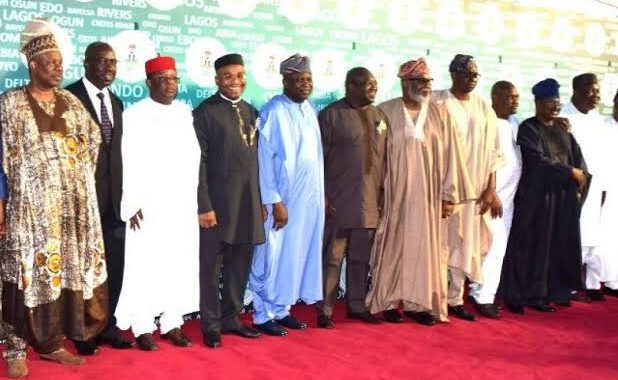The Nigeria Governors’ Forum (NGF) has resolved to put the necessary legal frameworks and institutions in place for States Fiscal Transparency Accountability, and Sustainability (SFTAS).
SFTAS is a World Bank support and intervention designed to support Nigerian states implement a Fiscal Sustainability Plan.
The forum said this in a communiqué issued on Wednesday night after its 30th teleconference.
It also agreed on the need for states to meet their SFTAS obligations.
It noted that the governors at the meeting received presentations from the World Bank team led by the Country Director for Nigeria, Shubham Chaudhuri, on the Nigeria Covid-19 Action Recovery and Economic Stimulus – Programme for Results (Nigeria CARES) and SFTAS.
It stated that the World Bank team commended the commitment and actions of state governors for establishing and resourcing CARES programme State Coordinating Units under their ministries of Planning.
It stated that the bank, however, requested the governors’ additional support in areas such as the adoption of a fund release policy for improved predictability of resources flow to CARES delivery MDAs.
The bank also called for governors’ support on adoption and institutionalisation of protocols for reporting, management and investigation of fraud and corruption in MDAs implementing CARES.
Other areas of expected supports includes the release of 2021 State budgets to MDAs for the commencement of CARES-related activities.
“The Bank also urged the support of governors to ensure that their ministries of finance and ministries of justice fast track the execution of subsidiary agreements for the CARES programme,” said the communique.
It noted that updates on the SFTAS programme showed that targets for results and disbursements on the 2018 and 2019 Annual Performance Assessments (APA) and new COVID-19 2020 Disbursement Linked Indicators (DLIs) had been exceeded.

“For the SFTAS 2020 APA and new COVID-19 DLIs, all 36 states are on track to fully meet the eligibility criteria of having National Chart of Account (NCOA) compliant FY2021 budget published online by Jan. 31, 2021.
“Under the SFTAS Programme for Results, 23 States have already passed strong state-level debt legislation,” it said.
The legislation stipulates the responsibilities for contracting, recording/reporting state debt; as well as state fiscal and debt rules/limits.
The forum, however, said a strong collective commitment was made for the remaining 13 States to pass such state-level debt legislation by Dec. 31.
This was to help Nigeria successfully meet the World Bank Sustainable Debt Financing Policy (SDFP) by strengthening debt management, debt transparency and fiscal responsibility at the state-level.
The communiqué added that NGF SFTAS Programme Lead, Olanrewaju Ajogbasile, provided key lessons that accounted for the success of performing states in the implementation of the SFTAS programme.
These, according to Olanrewaju, included the institutionalisation of a steering committee, high level monitoring and ownership.
It also included regular briefings to the state governor or state executive council; dedicated budget under the Ministry of Finance to support SFTAS operations.
It also includes an incentivised environment for state government officials working on SFTAS activities, and provision of basic ICT infrastructure arrangements for focal MDAs to ensure that they are able to access remote technical assistance and meet reform actions in time.
The communiqué added that NGF Chairman, Gov. Kayode Fayemi, briefed the forum on an ongoing consolidation exercise between NGF and the Budget Office of the Federation to consolidate public finance data of the federal, states and local governments into a national budget portal.
Fayemi urged his colleagues to share details of their local government budgets and financial statements in addition to State government data already published.
It added that the forum received presentation from Minister for Agriculture and Rural Development, Mohammed Nanono, on the second phase of farmer enumeration for the Agric for Food and Jobs Plan (AFJP).
The News Agency of Nigeria (NAN) reports that AFJP is a component of the Nigerian Economic Sustainability Plan (NESP) approved by Mr President and the Federal Executive Council (FEC) on June 24, 2020.
The programme is designed to help mitigate the impact of COVID 19 on smallholder farmers and the entire agricultural value chain.
The second phase of the enumeration targets the registration of up to 10 million farmers in the AFJP database.
To boost food production, 2.4 million small holder farmers were initially targeted for registration to be provided with input funding, with about 30,000 N power (N Agro) graduates engaged and trained to carry out the farmer registration. (NAN)